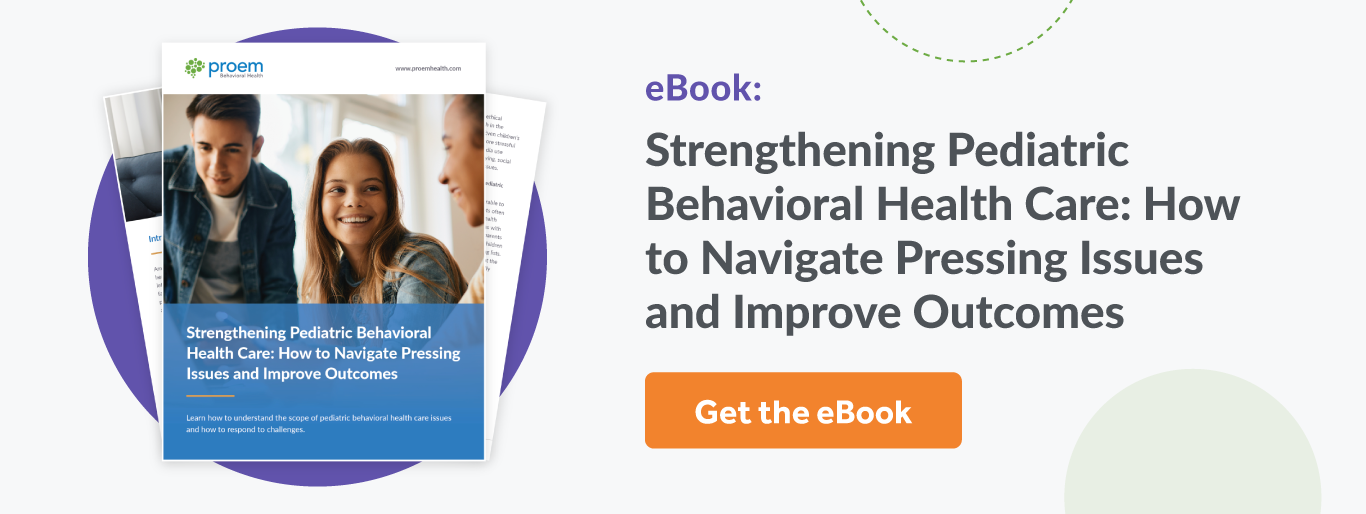The United States is in an undeniable mental health crisis. Issues like depression and anxiety are receiving increased attention by the media and government agencies. But the bulk of these conversations center on adult care, leaving out the millions of children and adolescents who struggle with mental illness. That's unfortunate but recognizing this is happening opens the door to improving pediatric behavioral health services in our country. Achieving early intervention for children with mental illness can substantially improve their outlook and quality of life. Research shows that approximately 50% of all lifetime mental health conditions develop before age 18 and 63% by age 25. The earlier and more effectively we identify those conditions, the better we can help put children and adolescents on paths to improved management and recovery.
The Overlooked Crisis of Pediatric Behavioral Health
Just how prevalent are pediatric mental health issues? Consider that according to the Centers for Disease Control (CDC), almost one in seven U.S. children ages 3 to 17 have a current, diagnosed mental or behavioral disorder. And only about 20% of children who need pediatric behavioral health services receive them. That number doesn't account for the many children without a diagnosable or diagnosed condition who nonetheless struggle emotionally, behaviorally and/or socially.
We must ask ourselves why, with adult mental health care so prevalent in the news, pediatric behavioral health still gets inadequate attention.
Part of the issue, of course, is that children often cannot speak for themselves. Children usually don't blog about their depression or pitch stories to news outlets. While there are plenty of child celebrities, their mental wellness is typically not the subject of coverage. Children with mental illness often suffer in silence, waiting for an adult to notice something isn't right.
But waiting and hoping that an adult identifies a potential problem in a child is not a viable option or solution if we hope to help children and adolescents. We need better screening mechanisms and a commitment to assessing every child so we can quickly identify mental health issues.
The Need for Effective Adolescent and Child Mental Health Assessments
Pediatric behavioral health does not — and cannot — look like adult care, which follows a different pattern from the beginning. Outside of court-mandated treatment, most adults come to therapy by choice. They recognize a problem and seek expert help to get better.
Children lack the experience and self-understanding to go through this process, particularly at younger ages. Instead, they communicate their need for help with "problem" behaviors at home, at school and in social settings.
Eventually, a parent, guardian or adult in the child's life (e.g., teacher, doctor) notices something isn't right. And if the child is fortunate, someone brings them to therapy to get the help they need.
There are several problems with this adult-driven diagnostic model for pediatric behavioral health. First, we can't expect parents, caregivers and other adults to consistently spot and identify mental health red flags. Yet identifying mental health disorders in childhood and adolescence is critical to healthy overall development. As the American Psychological Association points out, most common mental disorders — including many of the riskiest — begin in childhood or adolescence. This period of life is critical for lifelong mental health, yet barriers to diagnosis keep many children vulnerable, their condition(s) undiagnosed.
A critical way to close the gap is through the usage of child and adolescent mental health screening tools. Primary health care providers need effective, age-appropriate tools that don't add to the clinical workload and can quickly identify risk factors in any child or teen who walks through their door. Fortunately, such tools — in the forms of child mental health assessments and other solutions, are available and can be easily added and integrated into workflows.
Pediatric Behavioral Health Must Consider Child Development
Children are not "small adults." A child's mind is not fully developed and thus responds to the world differently from an adult’s mind. This is particularly notable when it comes to traumatic or extremely stressful events, which can permanently affect a child's relationship with others and the world around them.
Children who have experienced stressful emotional experiences may not be able to describe or even understand how they feel. Some children might dissociate or "shut down." Others might become hyperactivated and prone to more intense emotional responses.
Clinical care must respond to the child on their developmental level. Instead of expecting children to "talk through" trauma on an adult level, providers need to consider the child's developmental level and treat it accordingly.
In most cases, that means educating and working with the parent to help the child in all aspects of life.
Improving Pediatric Behavioral Health Services by Involving Parents and Caregivers
Research has shown that dyadic care models, which involve the parent or guardian and the child, are three times as effective as models that treat the child alone.
Adult involvement is essential because children, unlike adults, depend on caregivers to meet their basic needs. No conscientious parent would send a child into a medical office alone and expect the child to listen to, understand and then follow a doctor's orders without help. Yet that is exactly what can happen if pediatric behavioral health defaults to the adult behavioral health model.
"You can't just take a child into a room, do psychotherapy, and think, 'Well, that's going to work when they go back out into the world,' because they're not in charge of themselves," clinician Genevieve Daftary, MD, told HealthCity.
Children need adults to help them practice skills learned in therapy, just like adults assist children with their homework. For example, in cognitive behavioral therapy (CBT), children learn to challenge and replace maladaptive thoughts. Adults can help children practice these exercises at home, improving treatment efficacy.
Caregiver involvement also creates a healthy home environment. Consider this quote from the Center on the Developing Child at Harvard University:
"The emotional well-being of young children is directly tied to the functioning of their caregivers and the families in which they live. When these relationships are abusive, threatening, chronically neglectful, or otherwise psychologically harmful, they are a potent risk factor for the development of early mental health problems. In contrast, when relationships are reliably responsive and supportive, they can actually buffer young children from the adverse effects of other stressors. Therefore, reducing the stressors affecting children requires addressing the stresses on their families."
The more we can build healthy interactions between parent and child, the more we prepare the child for lifelong mental wellness.
How Proem Supports Behavioral Health in Pediatric Settings
Pediatric behavioral health services must be collaborative and proactive. On the provider's end, that means routine screening for mental and behavioral health needs.
Proem supports pediatric mental health screening, assessment and diagnosis with digital, evidence-based screening and monitoring solutions that are written for specific age groups to ensure the questions can be easily understood by the child. Proem uses child and adolescent mental health screening tools that are easy to integrate into any intake process, allowing clinicians to identify children and teens who need further mental health evaluations. Parent versions of the tools also enable clinicians to take the parents' perspective into account when identifying and treating pediatric behavioral health conditions.
Schedule a demo of Proem today to learn how your organization can advance the cause of achieving better pediatric behavioral health.





.png)










